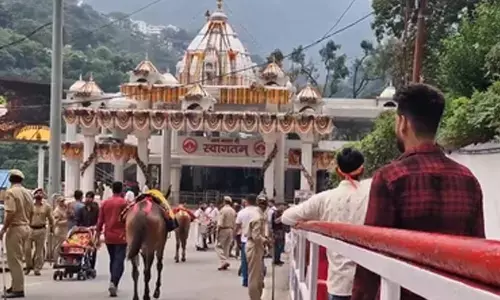Creation is all about mirth, not misery!

Hyderabadis must have seen the architectural monstrosity that stands in front of the Public Gardens, adjacent to the building which houses the All India Radio. And thereby hangs a tale.
Hyderabadis must have seen the architectural monstrosity that stands in front of the Public Gardens, adjacent to the building which houses the All India Radio. And thereby hangs a tale.
This site, in 1985, was a vacant plot belonging to the Hyderabad Agricultural Cooperative Association (HACA), a cooperative agricultural marketing federation with jurisdiction over the erstwhile Nizam's Hyderabad state.
Even in those pre-boom days, real estate always drew special attention, especially a piece of vacant land. The piece of land was, therefore, being eyed covetously by various organisations including the Tirumala Tirupati Devasthanams (TTD), the government of India and other private interests.
This columnist was, at that time, the Registrar of Cooperative Societies of the (then) State of Andhra Pradesh. As the custodian of the interests of the cooperative movement of the State, he wished to make sure that the land in question remained with HACA and put to some productive use.
With the wholehearted support of K Madhavrao, the then Secretary in charge of the Agriculture and Cooperation Department in the State government, he set about the task of constructing a multi-storied office complex. Such a venture would normally have attracted the attention of the corridors of power and the higher echelons of the political and bureaucratic circles.
However, as the land belonged to an autonomous cooperative society, no department of the government came into the picture, the work went on smoothly. Cooperative Enterprises and Public Sector Undertakings of the State and Central governments were canvassed for buying space in the proposed building and paying the requisite amounts in advance.
Very soon the funds required for the building became available. And thus came into being the building that one sees now. This somewhat ugly exterior of the building is attributable partly to the fact that different portions were built as and when finances became available.
The drama that accompanied the inauguration of the building by NT Rama Rao, the Chief Minister of the State, at that time, is a different story altogether. There is a saying in Telugu that even a crow finds its offspring lovable. This columnist can, therefore, perhaps, be forgiven for feeling a surge of pride whenever he passes by that building!
This columnist also recalls with similar fondness a building for a veterinary dispensary at Machilipatnam, the construction of which he was able to fund, in an earlier stint as the Collector of Krishna district. It is not as though no other major achievements worth recollecting readily come to mind.
It is only that concrete realities, though trivial in value, are etched more sharply in one's memory than other major achievements like formulation of policies and implementation of programmes, many of them at the national level and some even in other countries and in the international arena.
The universe is, in its essential form, all about affection and happiness. All religions, Hinduism, Islam or Christianity speak of the greatness of the qualities of peace, love and joy. While the Bible extols those virtues, the very name Islam derives itself from the same root as the greeting "salam" meaning "peace" in Arabic. And the manner in which the entire universe is organised, and functions, is surely suggestive of its origin having been a source of pleasure for the Creator?
And if the Supreme Being created the universe, others have created things of their own. A Gandhi or a Mountbatten can take credit for having fathered India or Pakistan, while a Le Corbusier can do so for being the creator of Chandigarh. Similarly, the Hitec City in the twin cities owes its existence to Chandrababu Naidu.
The point behind these illustrations is that every human being can taste the pleasure of creating something with the mind providing the idea, or the software and the body the actual form, or the hardware.
One has only to observe a potter or a carpenter at work to appreciate the sheer beauty and arresting splendour of the act of creation.
A painter or sculptor can also provide joy through talent and effort. In the same manner, an engineer can create imposing monuments while a doctor can create the happiness that comes from relief from pain or recovery from disease.
A teacher creates knowledge and an advocate the satisfaction of a dispute having been settled. Da Vinci's Mona Lisa has enthralled millions of people across centuries. Likewise, Tagore's Gitanjali has captured the hearts of millions of readers across the world and Beethoven's Moonlight Sonata has provided immeasurable joy to countless listeners for ages.
As a matter of fact, nature is the greatest of all creators. If one cuts a tree, the trunk sprouts again. The recent devastating forest fire in Australia, which could not be control by human effort for weeks, was put out by torrential rain in just a couple of hours.
How one wishes that the entire humanity engaged itself with the task of creating things 'bright and beautiful' and 'wise and wonderful' - as Cecil Alexander put it so wonderfully in her hymn for little children 'the Maker of Heaven and Earth'.
One is having to say this because, sadly, there is the murkier side of the story of creation which mankind has been a pained witness to from time to time. The myth of racial superiority created by Hitler resulted in massive genocide in the Second World War.
And one has only to look around to realise that even today, in the third decade of the 20th century, the scourges of strife and conflict continue to plague mankind. What is worse, the root causes of the situation are such petty things as religion or race, or most often, greed.
Just as a clown or a witty speaker can create mirth or laughter, a hate speech can spread disaffection and lead to riots. Neglect and carelessness can lead to disasters such as floods, while preventive steps taken by governments in advance can save thousands of lives in the event of a cyclone striking a city.
The point to ponder about seems to be that, when it is within the capacity of a human being to create so much pleasure or pain through the employment of intellectual prowess or physical strength, why so much effort is wasted in the wrong choice!
(The writer is former Chief Secretary, Government of Andhra Pradesh)
















